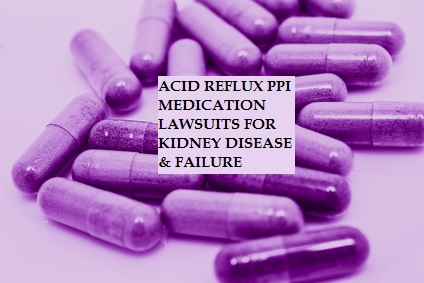Individuals who have suffered kidney problems after taking proton pump inhibitors (PPIs), such as Nexium, Prilosec, Prevacid and others, have asked again to have their lawsuits centralized in federal court before a singe federal judge. Previously, they asked the Judicial Panel on Multidistrict Litigation (JPML) to create a multidistrict litigation (MDL) docket for the cases. A MDL is a type of legal proceeding that helps federal courts efficiently manage many similar cases filed in many different courts across the U.S. by allowing the temporary transfer of all of the federal civil lawsuits to one or more district courts for pretrial consolidation or coordination. The JPML is a group of federal judges designated by the Chief Justice of the United States, which has the responsibility for determining which cases qualify for MDL treatment, as well as which district court to transfer and consolidate these cases. The transfers are made if the Panel determines that the transfers will result in the convenience of the parties and witnesses and will promote the just and efficient conduct of the cases. (For more information about MDLs and the JPML, contact Borgess Law.)
However, on February 2, 2017, the JPML refused to create a new MDL based on 4 reasons: (1) the named defendants vary from action to action; (2) the various defendants are competitors; (3) a significant amount of the discovery in these actions appears almost certain to be defendant-specific; and (4) the current number of cases.
Now the claimants have asked the JPML to reconsider, pointing out that the number of claims has significantly increased. The JPML will hear arguments at a July 27th hearing.
Proton pump inhibitors (PPIs) work by reducing the amount of acid in the stomach and are used to treat conditions such as gastroesophageal reflux disease (GERD), stomach and small intestine ulcers, and inflammation of the esophagus. They are available both as prescription and as over-the-counter (OTC) medications. Per the FDA, in 2009, approximately 21 million patients filled PPI prescriptions at outpatient retail pharmacies in the United States. Prescription PPIs include Nexium (esomeprazole magnesium), Dexilant (dexlansoprazole), Prilosec (omeprazole), Zegerid (omeprazole and sodium bicarbonate), Prevacid (lansoprazole), Protonix (pantoprazole sodium), and AcipHex (rabeprazole sodium). Vimovo is a prescription combination drug product that contains a PPI (esomeprazole magnesium and naproxen). Over-the-counter (OTC) PPIs include Prilosec OTC (omeprazole), Zegerid OTC (omeprazole and sodium bicarbonate), and Prevacid 24HR (lansoprazole).
In the pending PPI cases, the injured Plaintiffs claim that the manufacturers failed to adequately warn that the ingestion of these prescription and/or over-the-counter drugs could cause irreparable harm to the kidneys, including acute interstitial nephritis (AIN), chronic kidney disease (CKD), renal failure, and end-stage renal disease (ESRD). In fact, in January of 2016, a study published in the Journal of the American Medical Association found that PPI use was independently associated with a 20 – 50% higher risk of chronic kidney disease.
Borgess Law will continue to keep you updated on the status of the litigation.
How We Can Help:
If you or someone you love has taken a PPI and has been diagnosed with acute interstitial nephritis (AIN), chronic kidney disease (CKD), renal failure or end-stage renal disease, you should be aware of the ongoing litigation.
Attorney Pamela A. Borgess, the founder of Borgess Law, LLC, has extensive experience with numerous national high-profile defective medical drug/device cases. Attorney Borgess will happy to discuss your legal options. For more information about the acid reflux medication lawsuits for kidney disease and failure or to discuss a potential claim, contact Borgess Law at (567) 455-5955 or toll-free at (844) LAW-9144. You can also contact Borgess Law by submitting an online inquiry. Borgess Law never charges for initial consultations. We welcome any questions you may have.
